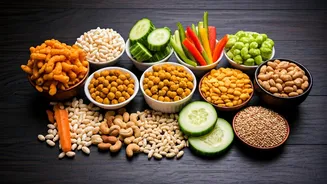Snacking's Significance in India
Snacking holds a significant place in the Indian lifestyle, often serving as a bridge between meals or a quick energy boost. It's a cultural norm, with
various regional snacks reflecting the country's diversity. However, the types of snacks available have evolved, with many being high in processed ingredients and unhealthy fats. To counter this, a shift toward healthier snacking is essential. Focusing on the nutritional value of snacks can drastically improve overall health. The shift involves selecting snacks rich in essential nutrients, like vitamins, minerals, and fiber, rather than those offering only empty calories. This change can impact energy levels, mood, and long-term health, making it crucial for every Indian to prioritize mindful snacking choices.
Embrace Fresh Fruits and Veggies
Fruits and vegetables are fundamental for healthy snacking. They offer a wealth of nutrients and are easily accessible in India. Include seasonal fruits such as mangoes, guavas, and pomegranates in your snack box. These fruits deliver vitamins, antioxidants, and fiber. Vegetables like carrots, cucumbers, and bell peppers can be cut into sticks and eaten with a light dip made of yogurt or hummus. The preparation can be simple and quick, making these options perfect for busy individuals. This promotes consistent consumption of essential vitamins and minerals, supporting immune function and offering natural sweetness that satisfies sugar cravings. Regularly integrating fruits and vegetables into your snack routine will significantly improve your dietary habits.
Nuts and Seeds for Energy
Nuts and seeds are excellent choices for providing sustained energy and healthy fats. They contain proteins, fiber, and essential minerals that are vital for overall health. In India, almonds, cashews, and walnuts are popular choices, while seeds such as pumpkin, sunflower, and flaxseeds are readily available. Consuming a small handful of mixed nuts and seeds provides a satisfying snack and delivers a wealth of nutrients. These are extremely versatile and can be used in various combinations. They can be added to your snack box, yogurt, or mixed with other ingredients. Always consider portion control to avoid consuming excessive calories. Including nuts and seeds in your snack routine boosts energy levels, improves brain function, and supports heart health.
Homemade Snack Recipes
Creating healthy snacks at home gives you control over the ingredients and nutritional content. There are various recipes to choose from, offering a blend of traditional and modern approaches that suit Indian tastes. Some quick and easy recipes include roasted chickpeas (chana) seasoned with spices. Another option is a mixture of puffed rice (murmura) with vegetables and spices, or a fruit chaat using a mixture of seasonal fruits. For a protein-packed snack, prepare a handful of sprouts with finely chopped onions, tomatoes, and coriander. These homemade snacks use fresh ingredients and can be adapted according to your preferences. They promote healthier eating habits and let you customize your snacks.
Healthy Snack Box Ideas
Preparing a snack box allows for mindful eating throughout the day, providing an easy way to access healthy options, particularly when on the go. Start by selecting a container that is easy to carry and fits your needs. You can pack a combination of fruits, vegetables, nuts, seeds, and homemade snacks. For instance, include carrot sticks, a small portion of trail mix, and a piece of fruit like an apple or orange. Another snack box can contain a small portion of sprout salad with a few multigrain crackers. Include a bottle of water to stay hydrated. Always pre-pack your snack box to avoid unhealthy options when you're hungry. This simple practice promotes better dietary habits and makes healthy choices simple.
Smart Snacking Strategies
Developing smart snacking strategies can improve overall health. Plan your snacks in advance to avoid impulsive, unhealthy choices. Keep healthy snacks visible and accessible in your home and workplace. Portion control is essential. Avoid overeating by measuring snack servings. Pay attention to your hunger cues, eating only when truly hungry. Mindful eating is important. Take your time, savouring each bite and focusing on the flavors and textures. Learn to read food labels, focusing on the nutrition facts and ingredients. Drink sufficient water throughout the day, as sometimes thirst can be mistaken for hunger. Using these strategies consistently will cultivate a positive relationship with food and improve your health.
Cultural Context and Adaptations
In India, cultural preferences greatly influence snacking choices. Many traditional snacks, although tasty, can be high in fats and sugars. Healthy adaptations can include reducing the amount of oil used in preparation. Introduce healthier ingredients, and experiment with spices to enhance flavor. For example, replace fried snacks with baked or air-fried versions. Swap sugary drinks with homemade fruit-infused water or unsweetened beverages. Embrace regional variations; focus on utilizing ingredients and methods specific to your culture. By making slight modifications, you can continue to enjoy familiar foods while promoting health. Adapting cultural practices to fit a healthy lifestyle will help you to enjoy both tradition and well-being.
Impact of Snacking Choices
The snacks you choose have a huge impact on your physical and mental health. Regular consumption of nutritious snacks stabilizes blood sugar levels, helping to prevent energy crashes and cravings. Healthy snacks provide essential nutrients that boost your immune system, improve cognitive function, and support heart health. They help in weight management by controlling hunger, preventing overeating during main meals, and providing necessary nutrients. In contrast, choosing unhealthy options can lead to various problems, including weight gain, increased risk of chronic diseases, and a generally poor quality of life. Making informed snacking choices provides immediate benefits and contributes to long-term health.
Overcoming Snacking Challenges
Several factors can make it challenging to maintain healthy snacking habits. One is dealing with cravings for processed and sugary foods. Understanding and managing these cravings is important. Identify trigger foods and create healthier alternatives to satisfy your taste buds. Busy schedules can often lead to quick and convenient but unhealthy choices. Preparing snacks in advance can help combat this. Additionally, emotional eating, such as snacking when feeling stressed or bored, is common. Develop strategies like practicing mindfulness or engaging in other activities to cope. Surrounding yourself with positive influences, such as friends and family supporting your healthy eating habits, can also help. A conscious effort to address these challenges helps you create sustainable, positive changes.















